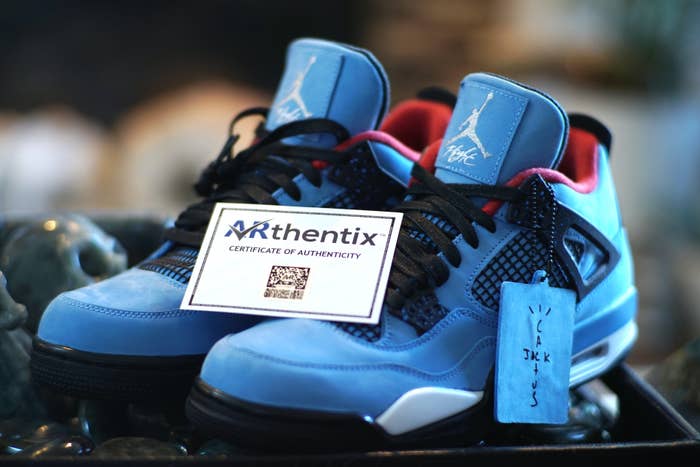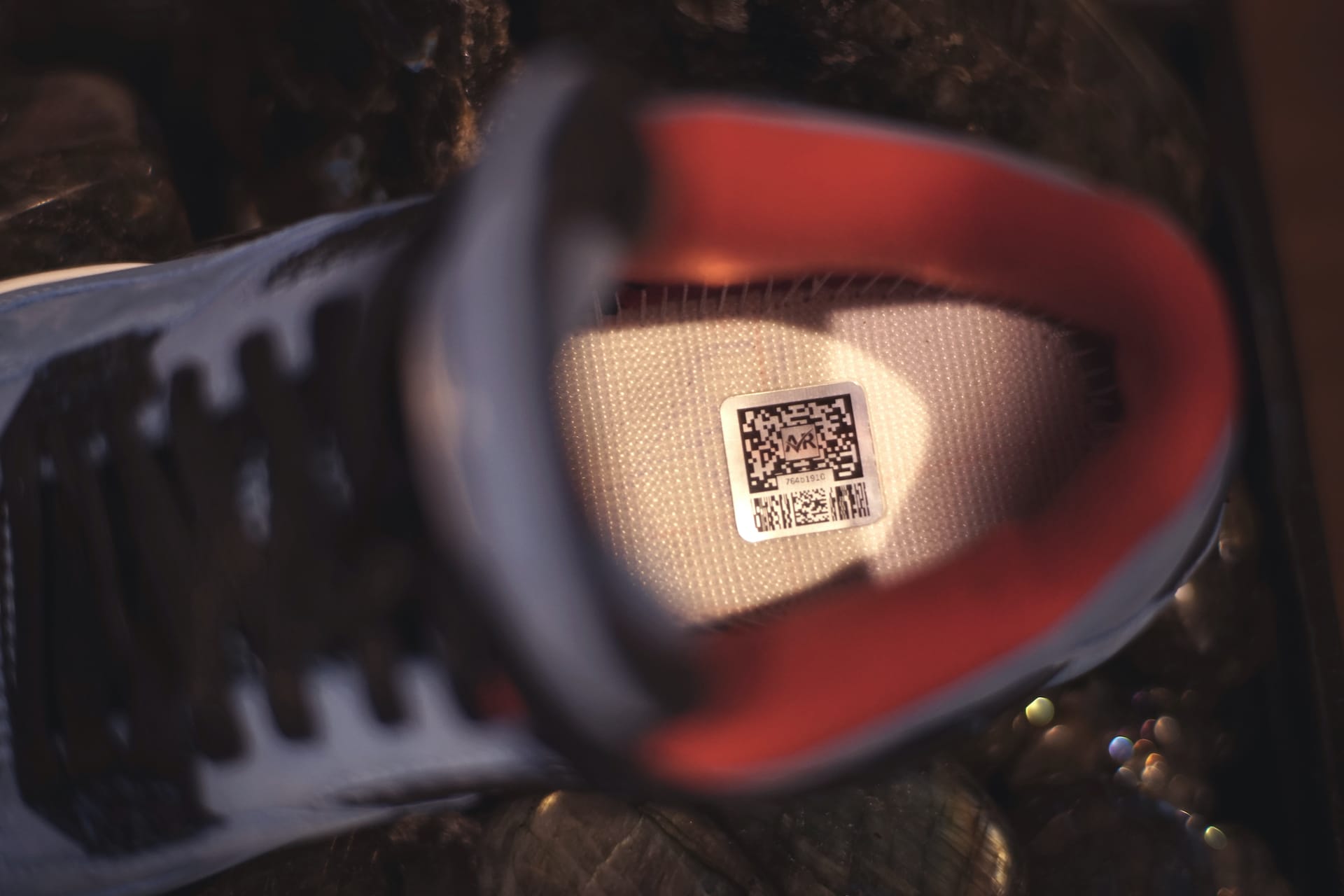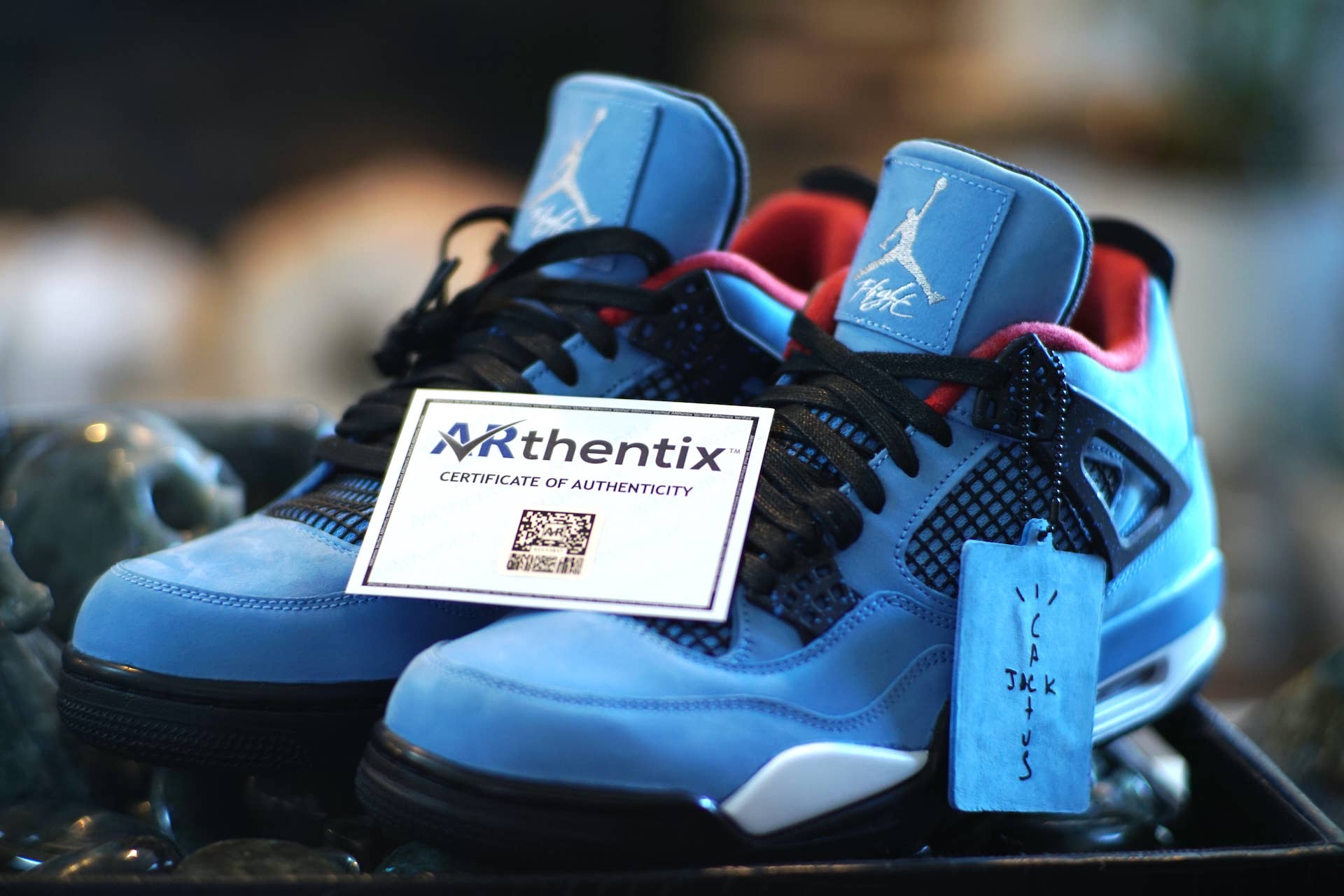
Every sneakerhead has been there: An insane grail seems to materialise out of the ether and appears on Craigslist at a price that’s too good to be true. It looks real. It feels real. You really, really want it to be real. But when the dude takes the box out of the back of the truck and asks you hand over the cash, how can you really be sure?
Over the last couple of years, the sneaker resale market has exploded. And as the sneakers keep dropping and the prices keep rising, making and selling convincing fakes has become a massive business—and it’s the innocent shoe-buyers who are losing out.
That’s where ARthentix hopes to come in. The new sneaker-authentication app, by Richmond, BC-based company Pro Exp Media, uses private blockchain technology, augmented reality, and state-of-the-art authenticity certificates to confirm the validity of sneaker purchases and protect buyers from counterfeits on the resale market. Its tamper-proof COA labels record sales data that can be scanned to guarantee that a shoe is legit.
The guys behind ARthentix have high hopes for the platform—they look forward to the day when all sneaker resellers are on board with the app, so that no one has to get burned again. Fresh off their October 1st launch, they’ve already partnered with Stay Fresh in Vancouver and Urban Necessities in Las Vegas.
We caught up with ARthentix founder Norm Lai and legendary sneakerhead Jaysee Lopez of Urban Necessities to talk about the app.
You guys have been doing this for a little while now. How did the app start?
Norm Lai: We built the system about three and a half years ago. We went to the L.A. Kings and basically asked them if they had any problems with counterfeiting. At the time, there was nothing stopping someone from going to the local Walmart, buying a jersey, slapping their own signature on it, and selling it online for $4,000. So they were having issues with that. Our tech was the solution.
How does the tech actually work?
Lai: We base it on a couple of different technologies. It’s based on augmented reality and also blockchain. Blockchain is used to keep the integrity of the ownership data. AR is used to verify the physical goods. Augmented reality has never been used this way before. But it’s like this: lumber used to be used to make buildings. Now it’s used to make chopsticks. It’s the same thing.
"It’s often the first question that gets asked. 'How do I know it’s real?' We tell people: you can do your own research on the brand. We’re authenticating these products in the store. And that helps. But having essentially a Certificate of Authenticity that validates it makes the selling process a lot easier." - Jaysee Lopez, Urban Necessities
How did you make the transition to authenticating sneakers?
Lai: Personally I started getting into sneakers four or five years ago. My big issue has been, when I meet up with someone, how do I know if it’s fake or if it’s real? I’m going to be parting with three, four hundred bucks, in some cases a G-note. I kept thinking, there’s got to be a better way.
What about the big online retailers that already authenticate their products?
Lai: Well, even guys like StockX are getting their tags duplicated overseas. You can go on a Chinese website right now and literally buy a StockX tag—or shoes, if you want to.
How did you connect with Jaysee?
Lai: We met Jay at Sneakercon in Vancouver. I saw him there and said, "Hey, that’s Jaysee from Urban Necessities!" So we pitched him the idea.
What were your impressions, Jaysee? How’d you get interested?
Jaysee Lopez: Well, once you have the potential for something to be uniform throughout the industry, you kind of have to get on it. It’s a matter of figuring out what the transition is, and then how we aggressively promote it. But it’s gonna help. It’s gonna help all of it. I want to essentially get everything to have it.

And how do you find the app works in your store?
Lopez: It works great, especially for the first-time or novice sneaker collector. Normally when you have the least amount of knowledge about something, when you’re just getting into it, that’s when you’re the most reckless. So this just ensures that what you’re buying is what you think you’re buying. It just makes it a much cleaner experience, you know? You don’t have to worry about it.
Is authenticity a big deal in your store? Do people often worry about whether a shoe is or isn’t fake?
Lopez: That’s one of the questions I get asked the most—especially from that guy or girl that walks in the store that’s never heard of me. It’s often the first question that gets asked. “How do I know it’s real?” We tell people: you can do your own research on the brand. We’re authenticating these products in the store. And that helps. But having essentially a Certificate of Authenticity that validates it makes the selling process a lot easier.
What’s your authentication process look like?
Lopez: For me in the store, I have a whole team that lives and breathes this. They know it like the back of their hand. If you do something long enough, you know what to look for. There are forums that help out with it, if it’s an item we haven’t seen before. And if our staff isn’t comfortable with it, we just leave it alone. It’s not worth the risk.
Have fakes become a bigger issue in the sneaker world recently?
Lopez: Yes. I think so. Drastically.
Lai: I agree with Jay. We’ve done a lot of research. There are products out there now called superfakes that are basically indistinguishable. Right now in the sneaker market, the fakes are going into the billions of dollars a year. A few weeks ago, the court of Los Angeles just stopped $4.3 million worth of Air Diors. That stuff comes in all the time. Unless you’re trained like Jay’s staff, it’s hard to know.
Who do you think will benefit most from ARthentix?
Lai: Jay is right that if you’re someone who really knows your stuff, you can probably tell when something is fake. But we’re talking about the general sneaker market, the first-time buyers, second-time buyers, even third-time buyers. The protection is for the meet-ups. Peer-to-peer transactions. Facebook Marketplace, Craigslist, Kijiji. That’s who we’re trying to protect. So many people are getting ripped off. We get messages all the time from people saying they wish this product had been out sooner to stop them getting ripped off.
What are the next steps for the app?
Lai: We’re working with guys like Jay, and Stay Fresh in Vancouver. The stores are going to put these labels on pretty much every shoe. That’s the starting point. When these shoes are in the wild, they’ll have the labels on them, and people will be able to tell if the shoe is real, where it came from, if it’s stolen, everything.

